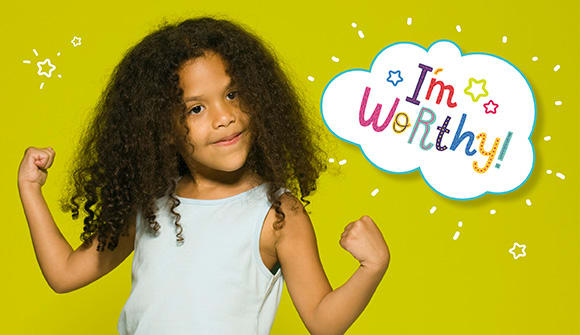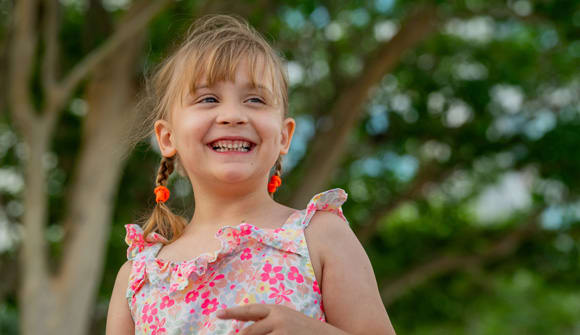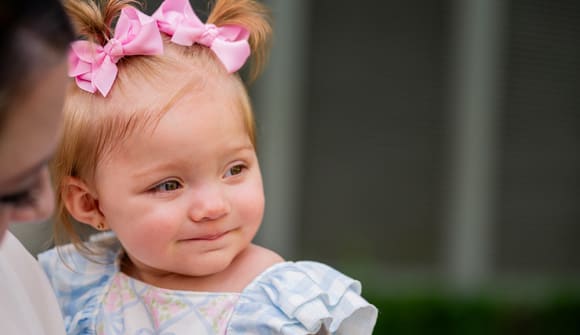Oh, my word
How mindful messages can help children build self-esteem.
Article Date:

Building a child’s self-esteem is an ongoing part of parenting. When a child feels confident and secure, he or she is more likely to succeed in school, maintain friendships and achieve personal goals.
But self-image and self-esteem are products of learning. Early childhood interactions, such as with parents, siblings and caregivers, have a major influence on self-worth. Experiences with teachers and peers, and external factors like social media and television shows, also reinforce what children think and feel about themselves.
“Children begin to self-evaluate around 8 years old, including how they see themselves physically and what they think about themselves,” said De’Von Patterson, PhD, a clinical psychologist with Baptist Behavioral Health at Baptist Clay Medical Campus. “It’s actually earlier now than what we’ve seen in the past, which I believe is driven in part by the digital world. Kiddos these days are more mature than their counterparts a decade ago.”
Dr. Patterson added, “Children tend to establish a baseline of their perception of self around 10 to 11 years old. But keep in mind that self-image is always flexible, so they can build upon it as they get older and mature or as they grow in therapy.”
Mindful messages
Self-identity and behavior may be determined or influenced by the words used to describe an individual. While some terms may not be inherently negative, they can still have a harmful or lasting impact on a child.
“Children are like sponges, absorbing everything they see and hear going on around them, which is why parents should really be mindful of where the feedback is coming from,” said Dr. Patterson. “Children take this information and evaluate themselves in areas of physical appearance, performance, value and relationships.”
Younger children often communicate in very concrete, blunt and simple terms. They are still learning social graces and norms. So, while we may view what they say as embarrassing or hurtful, they are often simply stating what they see. For example, a child may call a peer “big,” when he or she really means “tall.”
Regardless of the intention, what matters most is how children react when their unique traits or habits are noticed. It is important they learn the balance between embracing individuality and feeling comfortable with their peers.
“Sometimes, parents will say inaccurate things about their child’s physical appearance in order to be reassuring,” said Dr. Patterson. “If the child’s peers are making fun of his or her hair color or height, parents should not dismiss the observation as a false perception. Instead, they should acknowledge the comment and address the underlying issue of why their child is comparing himself or herself to others. Say something like, ‘Even if that is true, there is more about you as a person that other people value.’”
Embracing individuality
“A lot of times, we overemphasize our physical appearance in terms of how we evaluate our self-worth or who we are as a person,” said Dr. Patterson. “Children need to learn that's not a personality characteristic that defines us. Many traits make us unique, special and valued. We refer to this as emphasizing the whole person and showcasing that other attributes are equally, if not more, important than appearance.”
To help a child evaluate his or her unique character traits, behaviors or strengths, Dr. Patterson recommended asking open-ended questions that embrace individuality such as:
- How do other people see you?
- Are you kind?
- Are you funny?
- What else do you think makes you, “you”?
With a positive self-image, children recognize their assets and potential while being realistic about their limitations. When children have a negative self-image, they focus on their faults and weaknesses.
“If a kiddo is continually struggling with self-esteem, there is nothing to lose by going to therapy,” said Dr. Patterson. “I believe there are only benefits to be had when speaking with a trusted professional. In this case, it’s helping children become fully developed humans who can exist confidently and successfully in the real world.”
There’s no perfect way to parent. If it’s time for you or your child to get professional help, Baptist Behavioral Health and Wolfson Children’s Behavioral Health are here for you. Call 904.376.3800 to schedule with a provider.



